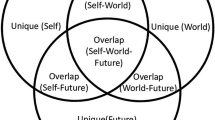Abstract
A developing body of research points to the role of family relationships and interactions as factors relevant to understanding unipolar depressive symptomatology and disorder in adolescents. This paper is focused on examining mechanisms by which adverse family processes may operate to increase adolescents' vulnerability to depression. The review is organized into a description and evaluation of four potential mechanisms by which families may influence adolescents' risk: (a) Stress/Support, (b) Social Interactional, (c) Cognitive, and (d) Affect Regulation. The presentation of the individual mechanisms is followed by a brief discussion of how they could be integrated to develop a fuller understanding of familial processes relevant to the etiology and maintenance of depressive conditions. Finally, we conclude with a discussion of overall limitations in the literature and recommendations for future research.
Similar content being viewed by others
REFERENCES
L. A. Bokut', “Embedding algebras in algebraically closed algebras,” Dokl. Akad. Nauk SSSR, 154, No. 5, 963-964 (1962).
L. A. Bokut', “Embeddings of Lie algebras in algebraically closed Lie algebras,” Algebra Logika, 1, No. 2, 47-53 (1962).
P. M. Cohn, “Progress in free associative algebras,” Isr. J. Math., 19, Nos. 1/2, 109-151 (1974).
L. A. Bokut', “Algebraically closed and simple Lie algebras,” Trudy Steklov Inst. Math., 148, 30-42 (1978).
L. A. Bokut', “Theorems of embedding in the theory of algebras,” Coll. Math., 14, 349-353 (1963).
L. Makar-Limanov, “Algebraically closed skew fields,” J. Alg., 93, No. 1, 117-135 (1985).
P. M. Cohn, “A brief history of infinite-dimensional skew fields,” Math. Sc., 17, No. 1, 1-14 (1992).
R. M. Wood, “Quaternionic eigenvalues,” Bull. London Math. Soc., 17, No. 2(65), 137-138 (1985).
P. M. Cohn, Free Rings and Their Relations, Academic Press, London (1971).
L. A. Bokut', “On a problem of Kaplanskii,” Sib. Mat. Zh., 4, No. 6, 1184-1185 (1963).
N. Jacobson, Structure of Rings, Coll. Publ. Am. Math. Soc., 37 (1964).
I. M. Gel'fand and V. S. Retakh, “Theory of noncommutative determinants and characteristic functions of graphs,” Funkts. An. Pril., 26, No. 4, 1-20 (1992).
Author information
Authors and Affiliations
Rights and permissions
About this article
Cite this article
Sheeber, L., Hops, H. & Davis, B. Family Processes in Adolescent Depression. Clin Child Fam Psychol Rev 4, 19–35 (2001). https://doi.org/10.1023/A:1009524626436
Issue Date:
DOI: https://doi.org/10.1023/A:1009524626436




